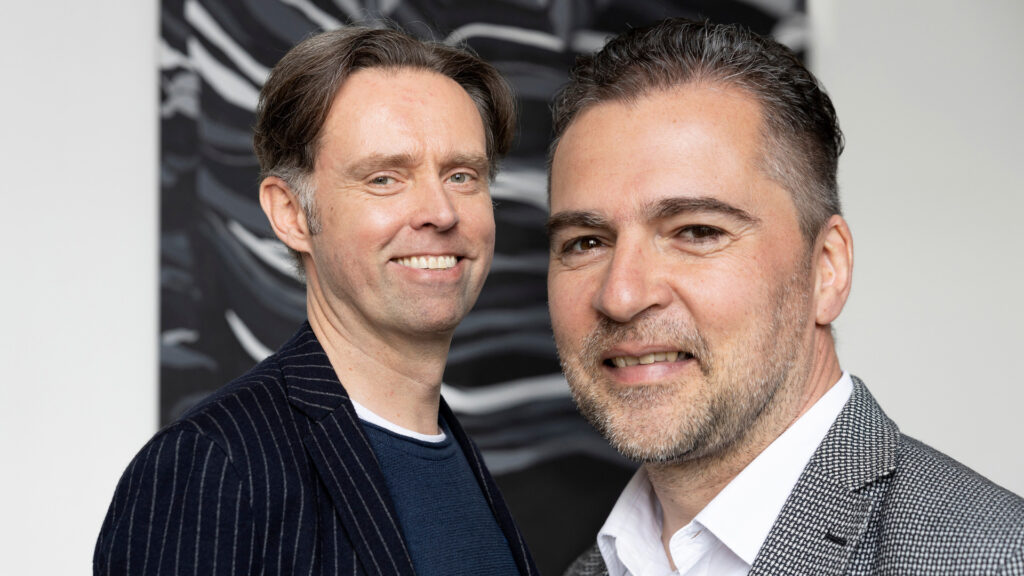Our university is using framework agreements for purchases more often. This means we have favourable agreements with a limited number of suppliers. How does this affect you as an end user? And are you sometimes allowed to deviate from those framework agreements? Elio Berardocco and Eric Patteet from the Purchasing Office explain.
Until a few years ago, as a department or an employee, you could decide which supplier to use. That is gradually becoming a thing of the past. ‘As a university, we are using framework agreements more often: these are agreements with one or more suppliers where we agree on prices, but the quantity to be purchased is not fixed’, Elio Berardocco, head of the Purchasing Office, clarifies. ‘We make purchases at suppliers that offer the best value for money, usually for a period of four years. These include both products and works or services: office equipment, furniture, renovations, green maintenance, cleaning, etc. As a large organisation, this allows us to agree on better conditions. It also streamlines the purchasing process and makes it more efficient. Extra time and work creep into handling many different suppliers.’
What is the deciding factor when choosing a supplier?
Elio Berardocco: ‘Important criteria are not only the price and quality, but also, for example, delivery time, service, sustainability. We certainly don’t always choose the cheapest supplier, although we can often negotiate attractive prices. To give an example, a standard office chair normally costs 1,000 euros at our regular supplier, but we pay 370 euros.’
Eric Patteet: ‘By making good agreements, for example on delivery, we avoid surprises. Suppose a company works with an inexperienced transport company, you risk a chilled product being delivered to the wrong place and not reaching cold storage in time. We want to avoid those kinds of situations as much as possible. By setting conditions in the specifications, we are in a stronger position against suppliers who make such mistakes.’
‘Some of the process is already getting easier. For each purchase, you can choose from up to five suppliers with whom we have agreed prices and conditions. They enter their prices into our ordering platform so you can easily compare.’
Eric Patteet, Purchasing Office
Is it a legal requirement that we use framework agreements?
Elio Berardocco: ‘Yes, as a government institution we are required to formally go to the market for major purchases, through a tender so to speak. This has been stipulated in the Public Procurement Act. The same is true if we annually spend large amounts with the same supplier. A purchase through a framework agreement always follows legal procedures. This is also important with a view to future audits. That way, you avoid subsidies being scrapped because a purchase was not made according to the rules.’
Have any important framework agreements been signed recently?
Eric Patteet: ‘Yes, just last month I signed a large number of framework agreements for lab products. This includes more than a million products, from hand soap and glassware to DNA kits and cell culture materials. Beforehand, I sat down with about ninety end users to see what was important to them. In total, I spent about two years working on it: analysing orders, consulting with end users, drawing up categories, preparing and publishing specifications, negotiating with suppliers, etc. The catalogues contain all-in prices, which also include packaging and transport, for example. And we also set additional conditions, including that the supplier should be able to provide advice around products and their use. End users are also allowed to test products so they can choose the one with the best results.’
What other major framework agreements are there?
Elio Berardocco: ‘Another example is the framework agreement for furniture, drawn up in cooperation with the Health and Safety Department, the Environment Office, the Infrastructure Department and a number of faculties. In our view, every employee has a right to ergonomic furniture and that by unifying, relocations will eventually become easier. We also concluded a large framework agreement for deliveries. Ordinary deliveries are made by DHL, but for special destinations or products that require special attention, we work with other companies with which we also have framework agreements.’

Does the system with framework agreement require major staff adjustments?
Eric Patteet: ‘Some of the process is already getting easier. For each purchase, you can choose from up to five suppliers with whom we have agreed prices and conditions. They enter their prices into our ordering platform so you can easily compare. You can also always negotiate prices, for example if you unexpectedly need more of a particular product. However, some researchers will have to introduce tests to integrate any new products from the framework agreements into their working methods and protocols. That can have quite an impact.’
Elio Berardocco: ‘Also keep in mind that a tender process can easily take several weeks or even months. If you are in the process of purchasing expensive equipment or entering into a new framework agreement, you should contact the Purchasing Office on time. Then we will make sure everything goes smoothly and correctly.’
And the suppliers? Do they have to adhere to strict conditions?
Eric Patteet: ‘In that respect, we are strongly protected by European legislation. For example, when supplying expensive equipment, companies have to put down a deposit that they only get back if the device works properly. Since this year, our suppliers are also required to submit their invoices through Peppol, a network that allows invoices to be entered directly into our payment system. The European Union
imposes the use of that system. An additional advantage is that, as the institution making the purchase, we can impose our own conditions in the specifications leading to a framework agreement. This gives us more agency to make suppliers work more uniform or customised.’
Can you deviate from a framework agreement in exceptional circumstances?
Elio Berardocco: ‘You can after providing clear argumentation, for example if a particular product is not available from the proposed suppliers.’
Eric Patteet: ‘Another reason may be that, as a researcher, you have always used a certain product during a specific research phase, so you can’t suddenly deviate from it for reasons of continuity. But please keep in mind that years later when the auditor visits, they might not grant the same exception as the Purchasing Office did.’
‘Important criteria are not only the price and quality, but also, for example, delivery time, service, sustainability. We certainly don’t always choose the cheapest supplier, although we can often negotiate attractive prices.’
Elio Berardocco, head of the Purchasing Office
Is a lower price with another supplier also an argument for deviation?
Elio Berardocco: ‘If you think you can get a better price elsewhere, you can always negotiate with our regular supplier. Be careful not to overlook things, as for example cancellation insurance might not be included. You really have to consider the full flow of a purchase. Will the product be delivered correctly? Will we get the bill through Peppol? Is there a contact number in case of problems? At the end of the day, you might end up with more problems with the supplier you found. If the price difference remains large, then you can state that as your argumentation and order outside the framework agreement. But keep in mind that is not necessarily audit-proof.’
Eric Patteet: ‘We know from experience that auditors don’t see a lower price with another supplier as an indisputable argument to not to use a framework agreement.’
Do departments respond positively to this new way of process?
Elio Berardocco: ‘Change always takes time. But when people see that we get better conditions this way, they quickly change their mind.’
Eric Patteet: ‘When I entered into discussions with researchers for the lab framework agreements a year and a half ago, I held my breath. Wrongly so, as almost everyone was immediately on board with what was presented. They actively joined in. I am very grateful to them for that. In the end, we all share the same goal and need each other’s knowledge to achieve good results. Working together is key.’
Learn more about framework contracts on Pintra.


